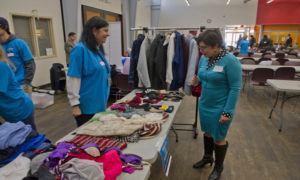 The Freeholder Board brought together a volunteer ambassador team comprised of more than 30 Camden County, Board of Social Services and Volunteers of America personnel to assist individuals experiencing homelessness. The organizations had professionals there to do a variety of services from providing healthcare to finding a temporary or permanent shelter.
The Freeholder Board brought together a volunteer ambassador team comprised of more than 30 Camden County, Board of Social Services and Volunteers of America personnel to assist individuals experiencing homelessness. The organizations had professionals there to do a variety of services from providing healthcare to finding a temporary or permanent shelter.
“Bringing these services under one consolidated roof is not only for the unsheltered, but we have hundreds of people who are couch surfing or staying in motels that could lose the roof over their head at any given moment,” said Freeholder Carmen Rodriguez, liaison to the Camden County Department of Health and Human Services. “These resources that we are bringing to bear will enable us to not only provide shelter, but to give individuals the ability to gain dignity through employment, wrap-around services and most importantly stability.”
Attendees will be provided with breakfast and lunch, and will be offered hot showers and haircuts. Information on Camden County’s transition to work programs, Work Now and Bridge to Work, will be presented. Work Now is a day labor program, and Bridge to Work is the next step in the continuum offering part-time employment maintaining County parks. Representatives of the NJ Division of Vital Statistics will be on hand, and bikes will be available from the Camden County bikeshare program.
“We have a moral imperative to aid the most vulnerable members of our community and help them stabilize themselves by getting them off the street and into permanent housing,” Rodriguez said. “These programs, whether it is prison re-entry or access to our Office of Mental Health and Addiction, when operating together, with organizations coordinating with each other, will ensure a higher success rate and save taxpayers money.”
Last year the Freeholder Board instituted a six-point plan to address homelessness with progressive programs and innovative partnerships in a coordinated way that has never been done before in Camden County. The programs are a holistic approach that encompass all facets of the many challenges related to this endemic issue. The fight to end homelessness the Freeholders are breaking down silos and providing more effective resources for individuals. The initiative addresses a spectrum of needs, from 24-hour access to social workers to seasonal employment for individuals looking for work.
Bringing all service organizations to the table and leveraging their combined strengths, the Freeholder Board believes that it can make an unprecedented impact against homelessness. This six-point plan is not only for the unsheltered, but also for the individuals getting by day to day, but could be unsheltered at a moment’s notice with the loss of a paycheck or sale of a property.
Representatives of the Camden County Office of Mental Health and Substance Abuse will be on hand, along with mental health and substance use treatment providers Genesis, Project HOPE, Oaks Integrated Care and Rutgers Behavioral Health.
“Our objective is to ensure our community knows that we can get them to a place where they can obtain the mental health and substance abuse services they need,” Rodriguez said. “We can provide one place to call. A unified information and referral system and a combined professional association.”
She went on to talk about the impact of the public health crisis as a catalyst for homelessness in our community.
“We know that opioids and heroin have played a significant role for many who are homeless, furthermore many of those same individuals have concurring challenges with behavior health as well,” Rodriguez said. “Both challenges, left untreated, can create destructive and dire consequences that result in homelessness. Now, we can leverage not just government resources, but the full weight of our combined partnerships behind the services needed to create stability for individuals and create better outcomes.”
According to the U.S. Department of Housing and Urban Development, Camden County experiences around 500 to 600 homeless individuals on any given day. The objective for this project is to make a multi-pronged effort to address this population with a variety of resources from employment to services from the Office of Mental Health and Addiction, while working to expand our housing first program. In addition, working alongside our partners, Volunteers of America, and a variety of other organizations, we will be able to provide more professional assistance to this population. Furthermore, we have leveraged multiple agencies, nonprofits and advocates to work in tandem to achieve our goals of ending homelessness.
